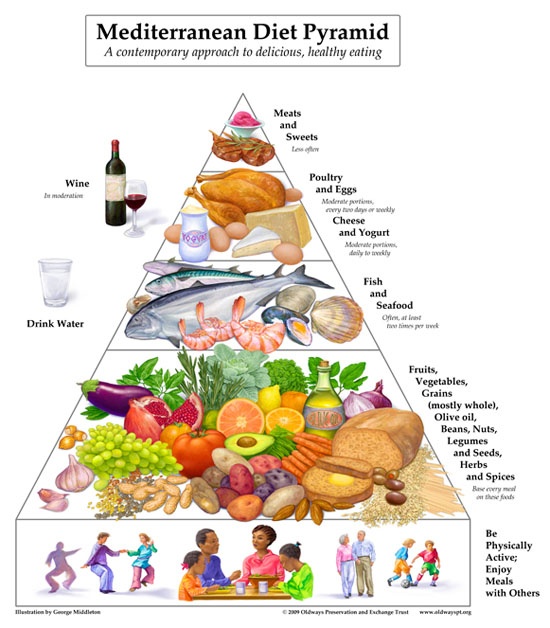Eat more whole fruit and vegetables. Eat fruit and vegetables with every meal. That's essential to eating Mediterranean style, and it is what internal medicine specialist, Dr. Miles Hassell advises his patients who want to reverse diabetes and improve their all around health.
So heap your plate with all kinds of fresh vegetables and fruits – the more color on your plate the better.

2009 Oldways Preservation & Exchange Trust www.oldwayspt.org
- Eat more raw nuts, whole unprocessed grains, seeds and beans. All of these foods provide great nutrition.
- Replace sweets with fruit. For cooking and salad dressings use olive oil –the best kind is labeled extra virgin.
- Eggs are good for you: up to one or even two a day, so long as you are following the rest of the diet and avoiding eating saturated fats in commercially fried foods and limit meats.
- Dairy is part of the Mediterranean diet too, but mainly yogurt, aged cheese or kefir -- which is similar to yogurt. Try eating unsweetened yogurt, Hassell recommends, because most store brands are loaded with sugars – and that is especially true for the low fat kinds. Add a little honey or fruit for sweetness.
- Eat plenty of fish – especially oily fish like mackerel, sardines, salmon and tuna. Dr Hassell recommends eating fish three or more times a week – especially oily or blueish fish like salmon, sardines and tuna. It can help increase our "good cholesterol."
(If you're pregnant, you need to avoid certain types of fish, so follow these Food and Drug Administration guidelines). - Meat and poultry are also included in the Mediterranean diet, but they are eaten in smaller amounts, as side dishes, or to flavor sauces and beans. Meat dishes should take up no more than one-fifth of your plate, according to Hassell.
- Eat whole grains: wheat, brown rice, couscous, bulgur, and polenta -- which is just a fancy name for grits.
|  |
These bottles contain two different types of digestif, a strong tasting liquor made from local fruits and herbs that are thought to help digestion.
| Some people are supersensitive to coffee. It makes their heart race and gives them anxious feelings. So if that's true for you, avoid it. But if you don't get these negative side-effects, and so long as you are not having problems sleeping, coffee can be good for you. Drinking the brew is linked to lower risk of diabetes. |
Alcohol in Moderation
Between 5 – 10 drinks a week, at maximum, seem to be good for our health.
"It doesn't seem to matter what you drink," says Dr. Hassell. "We have the most evidence for red wine, but any form of the ethanol molecule seems to work."
Don't go crazy here. There are caveats. Drinking isn't good for everyone: alcoholics and people with certain health problems, for example, should not drink alcohol at all. Women can have one drink a day at most– men can have two. (Studies suggest drinking increases women's risk of breast cancer. Dr. Hermann Kattlove discusses the risks here)
And pouring yourself a gigantic glass does not equal having one drink.
Traditionally in the Mediterranean, people enjoy a drink before, during or after a meal. And as with eating, Mediterranean people drink slowly and savor the moment.












